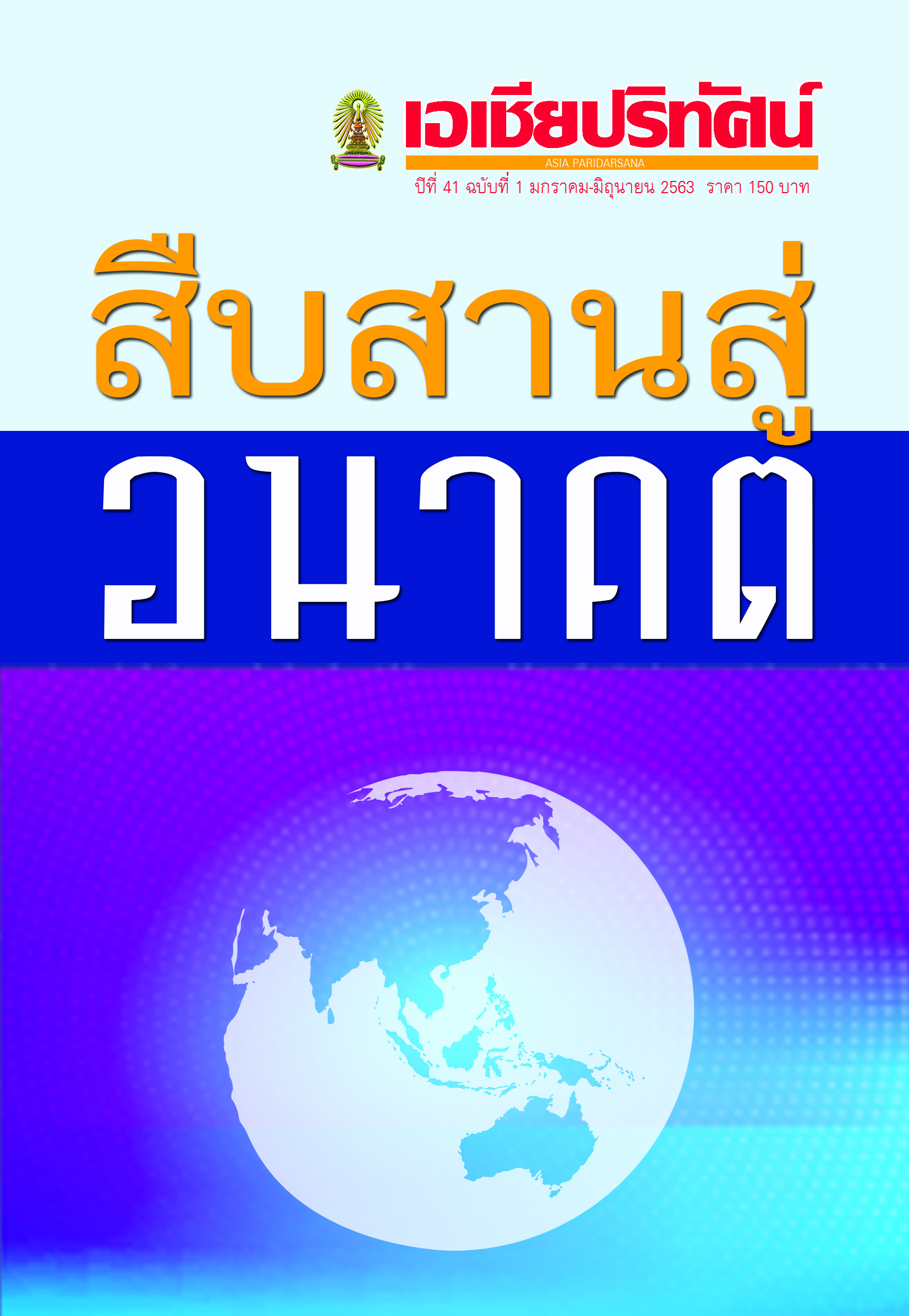การเมืองศิลธรรมในอินโดนีเซีย: การเลือกตั้งประธานาธิบดี 2019 และประชานิยมอิสลาม
Main Article Content
บทคัดย่อ
ชุมชนศีลธรรมทางการเมืองในอินโดนีเซียก่อตัวขึ้นบนพื้นฐานชาตินิยมหลากหลายรูปแบบ ไม่ว่าจะเป็นชาตินิยมทางศาสนา (Religious nationalism) ชาตินิยมทางชาติพันธุ์ (Ethno nationalism) และชาตินิยมพลเมือง (Civic nationalism) แนวคิดที่แตกต่างกันนี้สร้างแรงปะทะทางความคิดและส่งผลต่อการก่อร่างสร้างตัวของชุมชนจินตกรรมอินโดนีเซียนับตั้งแต่ยุคเริ่มต้นของการสร้างรัฐชาติ ทั้งยังส่งผลต่อการเมืองการปกครองและขบวนการเคลื่อนไหวทางการเมืองของประเทศในแต่ละยุคสมัย ไม่ว่าจะเป็นยุคประชาธิปไตยแบบชี้นนำภายใต้การปกครองของซูการ์โน (Guided Democracy, 1957 - 1966 ) ยุคระเบียบใหม่ภายใต้การปกครองของซูฮาร์โต้ (New Order, 1966 - 1998) และยุคปฏิรูปในปัจจุบัน (Reformasi, 1998 - ปัจจุบัน) ที่มีความพยายามส่งเสริมคุณค่าประชาธิปไตย ปฏิรูปกองทัพ และสนับสนุนกิจกรรมของภาคประชาสังคมให้ประชาชนเป็นตัวแสดงหลักในฐานะองค์อธิปัตย์ แต่ทว่าประชาธิปไตยในอินโดนีเซียปัจจุบันกลับเติบโตขึ้นในรูปแบบประชาธิปไตยแบบมีข้อจำกัดและมีข้อท้าทายหลายประการ ไม่ว่าจะเป็นการรักษาอำนาจทางการเมืองของชนชั้นนำ ความขัดแย้งทางชาติพันธุ์และศาสนา และรวมไปถึงกลุ่มเคลื่อนไหวทางการเมืองต่อต้านประชาธิปไตยซึ่งเกิดขึ้นอยู่เนืองๆในยุคปฏิรูป หนึ่งตัวอย่างที่ชัดเจนที่สุด คือ เหตุการณ์การต่อต้านอดีตผู้ว่าการมหานครจาการ์ต้า บาซูกี จาฮาจา ปูร์นามา (Basuki Tjahaja Purnama) หรือ อาฮก (Ahok) ระหว่าง ปี ค.ศ. 2016 และ ปี ค.ศ. 2017 อันถือว่าเป็นเหตุการณ์สำคัญทางการเมือง เมื่อมีการรวมตัวกันของกลุ่มมุสลิมฝ่ายอนุรักษ์นิยมเพื่อต่อต้านผู้สมัครเลือกตั้งผู้ว่าการมหานครจาการ์ต้าชาวจีนอินโดนีเซีย ถือว่าเป็นขบวนการเคลื่อนไหวทางการเมืองครั้งใหญ่ที่สุดนับตั้งแต่มีการปฏิรูปประเทศมา เหตุการณ์ครั้งนี้สะท้อนภาพความเปราะบางของสังคมพหุวัฒนธรรมนิยมและการก่อตัวของกระแสประชานิยมอิสลามที่มีสูงขึ้นในอินโดนีเซีย ส่งผลกระทบต่อเนื่องมาถึงกระบวนการสร้างประชาธิปไตยและการเลือกตั้งประธานาธิบดีปีค.ศ. 2019 อย่างหลีกเลี่ยงไม่ได้ บทความชิ้นนี้ศึกษาชุมชนศีลธรรมทางการเมืองโดยเฉพาะขบวนการเคลื่อนไหวของประชานิยมอิสลามที่ก่อตัวขึ้นผ่านแคมเปญการเลือกตั้งชิงเก้าอี้ประธานาธิบดีระหว่างหมายเลขหนึ่ง โจโก วิโดโด (Joko Widodo) หรือ โจโกวี (Jokowi) และมารูฟ อามิน ( Ma’ruf Amin) และหมายเลขสอง ปราโบโว ซูเบียนโต (Prabowo Subianto) และซานดิอาก้า อูโน่ (Sandiaga Uno)
Article Details
เอกสารอ้างอิง
1. “Berikut Syarat dan Makna Jihad: Aksi 22 Mei Tak Bisa Disebut Jihad.” 2019. Matamatapolitik, May 23. Accessed July 26, 2019. https://www.matamatapolitik.com/polling-in-depth-berikut-syarat-dan-makna-jihad-aksi-22-mei-tak-bisa-disebut-jihad/
2. Dewi, R. K. 2019 “6 Hoaks dan Cek Fakta Kerusuhan 22 Mei 2019, Brimob China hingga Ambulans Gerindra.” 2019. Kompas, May 23. Accessed July 28, 2019. https://nasional.kompas.com/read/2019/05/23/ 15562011/6-hoaks-dan-cek-fakta-kerusuhan-22-mei-2019-brimob-china-hingga-ambulans?page=all.
3. Hara, Abubakar Eby. 2017. Proceeding of the Third International Conference on Social and Political Sciences: Populism in In¬donesia and its Threats to Democracy. November 14-15, 2017. Amsterdam,Netherlands: Atlantis Press.
4. “Jokowi wins Indonesian presidential election 2019.” 2019. The Star On¬line, May 21. Accessed July 29, 2019. https://www.thestar.com.my/news/regional/2019/05/21/jokowi-wins-indonesian-presidential-election-2019
5. Kein. 2019. “Mencetak Santri sebagai Entrepreneur dan Eksportir” CNN Indonesia, May 4. Accessed July 29, 2019. https://www.cnnindo¬nesia.com/ekonomi/20190504162857-97-391927/mencetak-santri-sebagai-entrepreneur-dan-eksportir
6. “Kontroversi GARIS: Mobil Prabowo, 22 Mei, Isu Sempalan ISIS.” 2019. DetikNews, May 24. Accessed July 29, 2019. https://news.detik.com/berita/d-4563077/kontroversi-garis-mobil-prabowo-22-mei-isu-sempalan-isis
7. Liddle, R. 1996. “The Islamic Turn in Indonesia: A Political Explanation” The Journal of Asian Studies 55(3): 613-634
8. McGregor, Katharine, Jess Melvin and Annie Pohlman. 2018. The Indo¬nesian Genocide of 1965: Causes, Dynamics and Legacies. Cham, Switzerland Palgrave Macmillan.
9. Mietzner, Marcus. 2015. Reinventing Asian Populism: Jokowi’s Rise, De¬mocracy, Political Contestation in Indonesia. Honolulu: East-West Center
10. Mudde, C., and C. R. Kaltwasser, 2017. Populism: A Very Short Introduc¬tion. New York, NY: Oxford University Press.
11. Osman, M., and P. Waikar. 2018. “Fear and Loathing: Uncivil Islamism and Indonesia’s Anti-Ahok Movement”Indonesia (106): 89-109.
12. Ramadhani, N. F. And A. Anya, 2019. “Election Protest Turns Violent, One Reported Dead” The Jakarta Post, May 22. Accessed July 30, 2019. https://www.thejakartapost.com/news/2019/05/22/bawaslu- protest-turns-violent-one-reported-dead.html
13. Robinson, G. B. 2019. The Killing Season: A History of the Indonesian Massacres, 1965-66. Princeton, NJ Princeton University Press
14. Rosana, F.C. 2018 “17 Poin Pakta Integritas Ijtima Ulama II yang Disetujui Prabowo.” Tempo, September 16. Accessed July 28, 2019. https://nasional.tempo.co/read/1127048/17-poin-pakta-integritas-ijtima-ulama-ii-yang-disetujui-prabowo
15. Savitri, L.A. and D. Adriyanti. 2018. Proceeding International Institute of Social Studies (ISS): The Demise of Emancipatory Peasant Politics? Indonesian Fascism and the Rise of Islamic Populism, March 17-18, 2018. Netherlands: The Emancipatory Rural Politics Initiative.
16. Warburton, E. 2016. “Jokowi and the New Developmentalism” Bulletin of Indonesian Economic Studies 52(3) : 297-320.
17. Zarkasyi, H. F. 2008. “The Rise of Islamic Religious-Political Movements in Indonesia The Background, Present Situation and Future” Journal of Indonesian Islam 2: 336 -378


